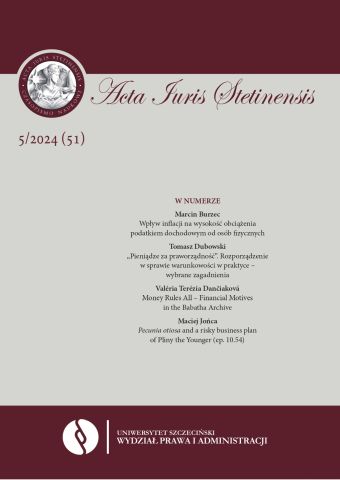






| Authors: |
Maciej
Jońca

University of Lomza |
| Keywords: | Pliny Trajan Roman economy municipal finances pecunia otiosa imperial financial policy forced loans mutuum |
| Whole issue publication date: | 2024-12 |
| Page range: | 12 (229-240) |
| Downloads ?: | 29 |
| 1. | Andreau J., Banking and Business in the Roman World, Cambridge 2003. |
| 2. | Babusiaux U., Die Durchsetzung ökonomischer Interessen im klassischen römischen Zivilprozessess, in: Lo Cascio E., Mantovani D. (eds.), Diritto romano e economia. Due modi di pensare e organizzare il mondo (nei primi tre secoli dell’Impero), Pavia 2018. |
| 3. | Balbo M., Oblighi del padrone ed equipaggiamento del fittavolo nella rifflessione dei giuristi, in: Lo Cascio E., Mantovani D. (eds.), Diritto romano e economia. Due modi di pensare e organizzare il mondo (nei primi tre secoli dell’Impero), Pavia 2018. |
| 4. | Bracci F., Plinio il Giovane. Epistole. Libro X. Introduzione, traduzione e commento, Pisa 2011. |
| 5. | Burton G.P., The Roman Imperial State, Provincial Governors and the Public Finances of Provincial Cities, 27 B.C.–A.D. 235, “Historia: Zeitschrift für Alte Geschichte” 2004, No. 53(3). |
| 6. | Capogrossi Colognesi L., Diritto, società ed economia in Roma antica e i Romanisti del Novecento, in: Lo Cascio E., Mantovani D. (eds.), Diritto romano e economia. Due modi di pensare e organizzare il mondo (nei primi tre secoli dell’Impero), Pavia 2018. |
| 7. | Carleton Andrews A., Pliny the Younger, Conformist, “The Classical Journal” 1938, No. 34(3). |
| 8. | Dębiński A., Jońca M., Leraczyk I., Łuka A. (eds.), Pliniusz Młodszy. Korespondencja z cesarzem Trajanem, vol. II: Komentarz, Lublin 2017. |
| 9. | Duncan-Jones R., The Finances of the Younger Pliny, “Papers of the British School at Rome” 1965, No. 33. |
| 10. | Farnsworth R., Contextualizing the Pliny/Trajan Letters: A Case for Critiquing the (American) Myth of Deliberative Discourse in (Roman) Society, “Rhetoric Society Quarterly” 1996, No. 26(1). |
| 11. | Gibson R.K., Man of High Empire. The Life of Pliny the Younger, Oxford 2000. |
| 12. | Harter B., De otio – oder: die vielen Töchter der Muße. Ein semantischer Streifzug als literarische Spurensuche durch die römische Briefliteratur, in: F.C. Eickhoff (ed.), Muße und Rekursivität in der antiken Briefliteratur, Tübingen 2016. |
| 13. | Jones C.P., A New Commentary on the Letters of Pliny, “Phoenix” 1968, No. 22(2). |
| 14. | Jońca M., Łuka A., Problem podwójnego obywatelstwa egipskiego terapeuty Harpokrasa (Plin., Ep. 10,5; 6; 7; 10): tekst – tłumaczenie – komentarz, “Zeszyty Prawnicze” 2016, No. 16(2). |
| 15. | Jońca M., Pliny and the Christians. An Attempt at Evaluation, “Revue Cirkevniho Prava” 2020, No. 78(1). |
| 16. | Kaser M., Das römische Privatrecht, München 1971. |
| 17. | Levick B., Pliny in Bithynia and What Followed, “Greece & Rome” 1979, No. 26(2). Lo Cascio E., La storia economica: i principali orientamenti degli studi (XIX–XX secolo), in: Lo Cascio E., Mantovani D. (eds.), Diritto romano e economia. Due modi di pensare e organizzare il mondo (nei primi tre secoli dell’Impero), Pavia 2018. |
| 18. | Lo Cascio E., Mantovani D. (eds.), Diritto romano e economia. Due modi di pensare e organizzare il mondo (nei primi tre secoli dell’Impero), Pavia 2018. |
| 19. | Lovato A., Pretium e quanti ea res est nei giuristi: rapporto fra il prezzo di mercato e il calcolo giuridico, in: Lo Cascio E., Mantovani D. (eds.), Diritto romano e economia. Due modi di pensare e organizzare il mondo (nei primi tre secoli dell’Impero), Pavia 2018. |
| 20. | Maganzani L., Economia e diritto Romano (XIX–XXI sec.). Storie varie di convergenze parallele, in: Lo Cascio E., Mantovani D. (eds.), Diritto romano e economia. Due modi di pensare e organizzare il mondo (nei primi tre secoli dell’Impero), Pavia 2018. |
| 21. | Mommsen Th., Zur Lebensgeschichte des Jüngeren Plinius, “Hermes” 1869, No. 3(1). Noreña C.F., The Social Economy of Pliny’s Correspondence with Trajan, “The American Journal of Philology” 2007, No. 128(2). |
| 22. | Rockwell K., DIMIDIATE MENANDER, “The Classical Outlook” 1974, No. 52(1). |
| 23. | Rostovtzeff M., The Social and Economic History of the Roman Empire, vol. I, Oxford 1957. |
| 24. | Sherwin-White A.N., The Letters of Pliny. A Historical and Social Commentary, Oxford 1966. |
| 25. | Sherwin-White A.N., Trajan’s Replies to Pliny: Authorship and Necessity, “The Journal of Roman Studies” 1962, No. 52(1–2). |
| 26. | Storchi Marino A., Per un lessico dei comportamenti “economici”. La sfera dell’otium, in: Storchi Marino A. (ed.), Economia, amministrazione e fiscalità nel mondo romano. Ricerche lessicali, Bari 2004. |
| 27. | Syme R., The Imperial Finances under Domitian, Nerva and Trajan, “The Journal of Roman Studies” 1930, No. 20. |
| 28. | Verhagen H.L.E., Security and Credit in Roman Law: The Historical Evolution of Pignus and Hypotheca, Oxford 2022. |
| 29. | Vidman L., Einige Bemerkungen zu Trajans Stil, “Listy filologické” 1987, No. 110(2). |
| 30. | Wallace-Hadrill A., Civilis Princeps: Between Citizen and King, “The Journal of Roman Studies” 1982, No. 72. |
| 31. | Wilcken U., Plinius’ Reisen in Bithynien und Pontus, “Hermes” 1914, No. 49(1). |
| 32. | Wilcken U., Zu den Kaiserreskripten, “Hermes” 1920, No. 55(1). |
| 33. | Woolf G., Pliny/Trajan and the Poetics of Empire, “The Classical Philology” 2015, No. 110. |